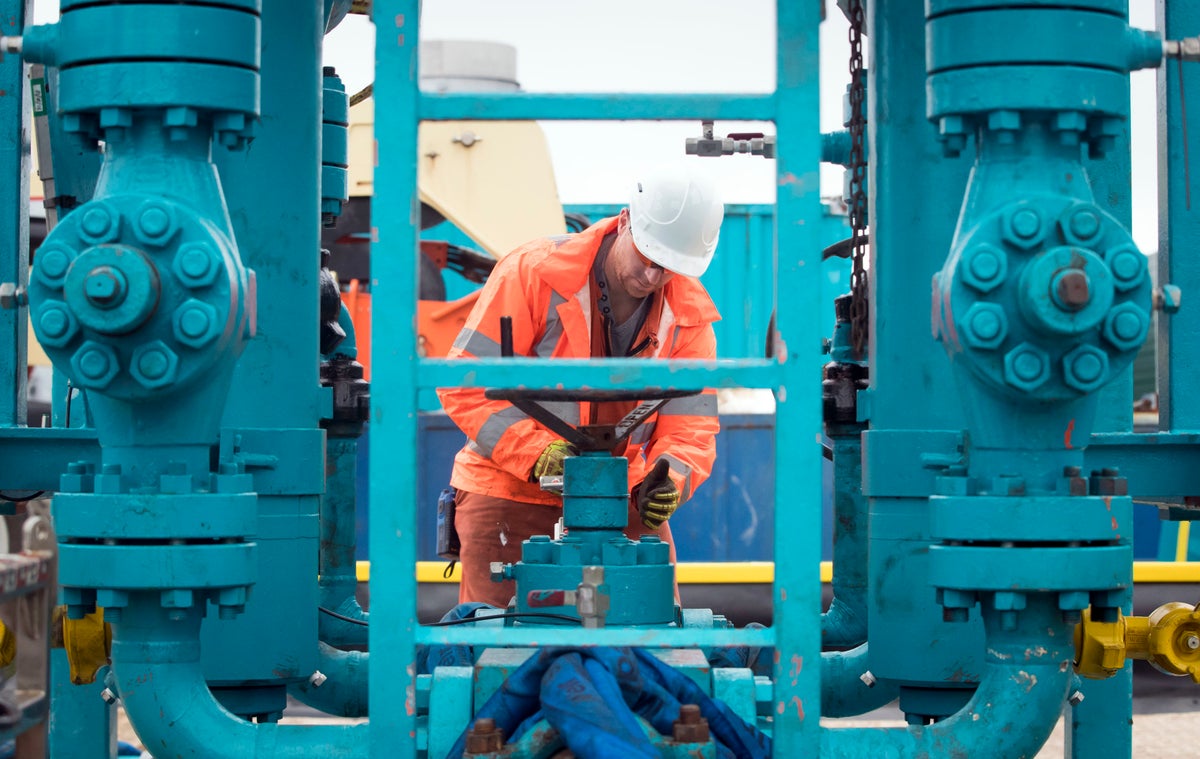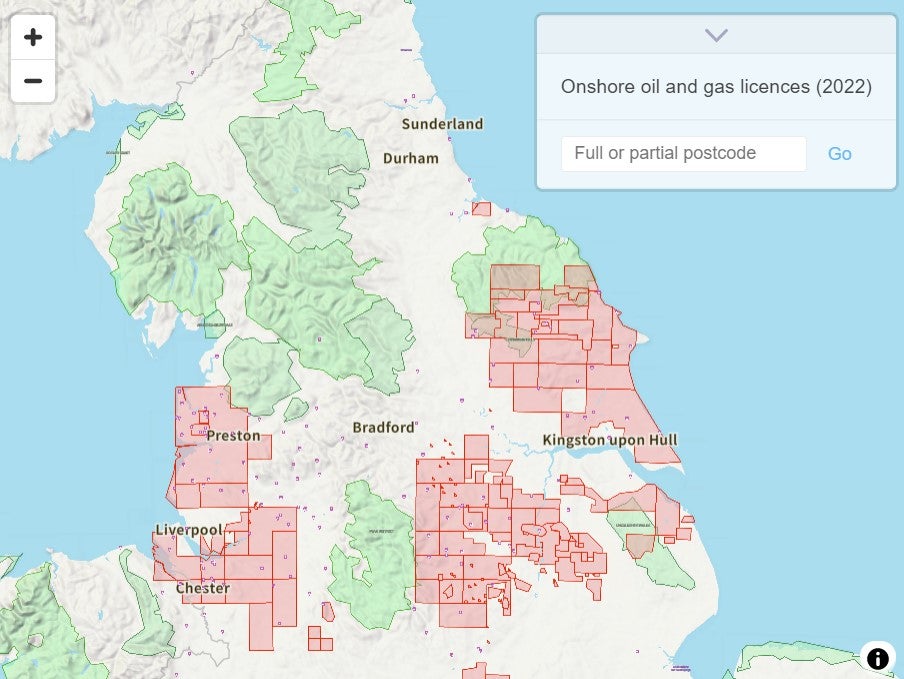
Liz Truss’s government has formally lifted a ban on fracking for shale gas despite the lack of safety data, saying it was “absolute priority” to boost energy supply.
Business secretary Jacob Rees-Mogg said all sources of energy needed to be explored, insisting that a “higher degree of risk and disturbance appears to us to be in the national interest”.
The move is part of a push to grant 100 new fossil fuel drilling licences, the business department announced on Thursday – despite conceding that there was still a need to “gather better data” on fracking safety.
A moratorium was imposed on fracking in 2019 after the industry regulator said it was not possible to predict the magnitude of earthquakes it might trigger.
A review of acceptable levels of seismic activity found that there was only “limited understanding” of the risks – but government claimed that ending the ban and allowing more drilling would allow more data to be gathered.
Despite concerns about earthquakes, Mr Rees-Mogg suggested higher levels of seismic activity would be allowed at drilling sites – saying the current limit of 0.5 on the Richter scale was “too low”.
“The seismic limits will be reviewed to see a proportionate level. 0.5 on the Richter scale, which is only noticeable with sophisticated machinery, it is quite right that fracking would not take place – that level is too low,” he told BBC Newsnight.
In a written statement, Mr Rees-Mogg said “tolerating a higher degree of risk and disturbance appears to us to be in the national interest”.
Speaking in the Commons, the business secretary rejected criticims from Labour, Lib Dem and some Tory MPs, – attacking the “hysteria” over earthquake risks, before claiming their concerns amounted to “sheer ludditery”.
Mark Menzies, Tory MP for Fylde in Lancashire, told Mr Rees-Mogg there was “nothing luddite” about the concerns of his constituents. He said Ms Truss had been “crystal clear” that fracking would require local consent.
The Tory backbencher – visibly angry – said the government should outline how local consent would be given if Ms Truss was to remain “a woman of her word, a woman we can believe in”.
Mark Fletcher, Tory MP for Bolsover, also shared his frustration. “The local consent plans don’t seem to wash. It seems to come back to local communities being bought off rather than having a vote,” he said – challenging the minister to say if residents will get a vote.
Mr Rees-Mogg did not answer directly, saying only the companies will have a responsibility to “develop packages that make the extraction of shale gas attractive to local communities”.
Speaking to reporters in New York, Ms Truss defended the idea of breaching a Tory manifesto pledge by lifting the ban on fracking, claiming the energy crisis is the “number one issue we face”.
The PM insisted she will not authorise “anything that carries a risk”, but the government is yet to produce evidence showing hydraulic shale gas extraction is safe.
The 2019 Conservative manifesto pledged not to lift England’s moratorium unless fracking was scientifically proven to be safe amid concerns over earthquakes.
The PM told reporters travelling with her during a UN summit in New York: “The context we’re talking about here is we don’t have enough domestic energy supplies … Fracking is a part of the energy mix.”
Mr Rees-Mogg said energy security was “an absolute priority” for the government. “To get there we will need to explore all avenues available to us ... so it’s right that we’ve lifted the pause to realise any potential sources of domestic gas.”
However, senior government adviser Lord Debden told The Independent this week that there is no evidence that fracking and North Sea extraction would have a meaningful impact on the price of gas.
Environmental groups hit out at the government move to lift the ban. Greenpeace energy security campaigner Philip Evans warning that drilling for more fossil fuels “will not lower bills, make us less dependent on volatile fossil fuel markets or cut our carbon emissions”.
The government said the British Geological Survey’s review of the fracking sector had recognised that we have “limited current understanding” of the risks.
Dr Doug Parr, Chief Scientist for Greenpeace UK, said it was clear the British Geological Survey showed that “there have been no significant breakthroughs in the science of prediction and management of earthquakes caused by fracking”.
Friends of the Earth campaigner Danny Gross said fracking was the most unpopular and least effective way of generating energy in the UK, and said any attempt to water down the rules that safeguarded against the process would “only fuel its unpopularity”.
Mr Gross said “ripping up the rules that protect people from fracking” will send “shockwaves” through many communities, adding: “This announcement suggests that the government is planning to throw communities under the bus by forcing them to accept ‘a higher degree of risk and disturbance’.”
Some 143 parliamentary constituencies, mainly in so-called “red wall” Tory seats in northern England and the Midlands, have licences which could potentially allow firms to examine gas reserve exploitation.
Friends of the Earth has published a map showing the areas in England where onshore oil and gas extraction – including fracking – could take place, including the “Bowland Shale Formation” area of interest for shale gas that stretches across the Midlands and north.

Ms Truss has stressed that government will only authorise fracking in areas where there is local consent, but it is not yet clear what incentive ministers will offer local communities.
The Department for Business, Energy and Industrial Strategy (BEIS) said applications will be considered “where there is local support”, and developers will need to have the licences, permissions and consents in place before they can drill.
BEIS also announced plans for a new oil and gas licensing round, to be launched by the North Sea Transition Authority in October, expected to lead to more than 100 new licences for oil and gas exploration in the North Sea.
Labour’s shadow climate secretary Ed Miliband said fracking was a “dangerous fantasy”, claiming it would “do nothing to cut energy bills, costs more than renewables, and is unsafe”.
Mr Miliband added: “The Tories have broken another promise because they are more interested in standing up for the fossil fuel lobby than the British people.”
The Liberal Democrats said the Tories were “treating people in rural areas like guinea pigs” when it came to the new push for fracking.
The party’s environment spokesperson Wera Hobhouse said: “The government’s own experts have refused to say fracking is safe. That they choose to plough on regardless shows a callous disregard for our communities and countryside.”
Green Party co-leader Adrian Ramsay condemned the government for choosing to “ignore warnings from its own advisers” and said fracking “will deepen our country’s dependence on fossil fuels” without bringing down fuel bills.
Chris Cornelius – founder of the UK’s first fracking company Cuadrilla Resources – warned that “no sensible investors” would back new projects – describing the end of the ban as a “political gesture” by ministers.
“I don’t think there is any chance of fracking in the UK in the near term,” he told The Guardian. “It’s very challenging geology, compared with North America … They will never be at scale [in the UK], because the capital costs are a huge issue.”







